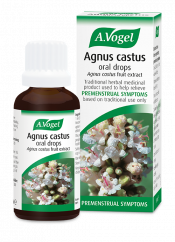Can you still get PMS whilst on the pill?
If you’ve been wondering if it’s still possible to experience PMS whilst on the pill, in short, the answer is yes! This could seem contradictory since many of us women may have initially been put on the pill or similar forms of birth control in order to help manage monthly symptoms; from heavy and hard-to-manage periods, to skin complaints getting us down.
So, if the pill is supposedly meant to help minimise some of these common complaints, how is it possible it could also be to blame for some unhelpful side effects of its own? Let’s delve a little deeper.
How can the pill create PMS symptoms?
1. Hormone levels can still drop off

It’s important to understand that all pills aren’t created equal. Although we have two main types (the combined versus the mini pill), within these categories there are still different types, with different balances and strengths of hormones.
The combined pill, in particular, may create an influx of symptoms at certain times of the month. As it more closely mimics the natural course of our menstrual cycle, we typically have a week’s break at the end of the month. However, during this time, hormone levels drop off which gives us a period (albeit a withdrawal bleed), and it’s this very drop off in hormones which could create the all-too-familiar PMS symptoms.
Whilst running pill packs together could be a tactic help to minimise monthly symptoms in the short-term, the next time you allow yourself to have a period, you could run the risk of heightening your symptoms even further. Plus, it’s recommended we have at least 4 periods per year in order to help clear out the lining of your womb. Therefore, this isn’t a long-term solution by any means.
2. A hormone imbalance could become apparent
Whilst birth control pills are created in order to provide a very specific dose of hormones, it’s possible that this precise balance of hormones might not be right for us! In this respect, combined pills may be considered better options as they provide a fairly balanced source of both sex hormones, oestrogen and progesterone. However, there are also progesterone-based methods to consider.
Progesterone-based contraceptives include the mini-pill, implant, injection or the Mirena coil. Whilst these also provide a more steady or predictable dose of hormones, without any breaks, they only provide one hormone rather than both together.
Therefore, it’s possible that these forms of contraceptives could also create a hormone imbalance similar to the one which manifests in the lead up to menopause; with low oestrogen relative to progesterone, otherwise known as progesterone dominance. This state has also been associated with PMS symptoms.
3. Your nutrient levels can become depleted
Something that isn’t commonly recognised in the allopathic world is the ability of the contraceptive pill to drain us of essential nutrients. This is thought to be mainly down to an increase in the urinary excretion of vitamins and minerals, but also potentially due to some of the effects of metabolism (remember, your body needs to work hard to metabolise any medications we consume and this requires energy!). Some of the main nutrients that we are at risk of becoming deficient in include the B vitamins, vitamin C, magnesium and zinc.1
As we know that many of these nutrients are important for helping to manage many of the symptoms we associate with PMS, including changes in mood, muscle cramps and maintaining healthy energy levels, it’s quite possible that the pill could be having a detrimental impact as a result of this.
What can be done to help?
If you’re worried that your current hormonal contraceptive could be contributing to some monthly symptoms, we’re here to help. Here, I run through some of my top tips for taking control and minimising your symptoms:
1. Track your cycle and symptoms

Whilst, in most cases, your cycle may be better regulated while taking a form of birth control (with your period either coming religiously or not at all if you’re on a progesterone-based method), your symptoms may not be quite so regular! Although the pill can, in some cases, make your cycle and symptoms less troublesome (fewer cramps and clearer skin are often among the top perks), it can still be the case that women struggle with PMS-type symptoms as a result of their chosen form of birth control.
My advice is to track your cycle with a more traditional diary, or download a free App to do this electronically. This helps to create a record of your symptoms which you can refer back to, allowing you to more easily see any patterns emerging.
2. Up your nutrient intake
If you’re on the pill, it may be helpful to take a sensibly-dosed multivitamin, especially as we now know we may be slightly more at risk of deficiencies. Plus, this is even more important if you’re struggling to manage some tricky symptoms.
Some top nutrient picks from me include magnesium and vitamin D, both of which have been found to help with common PMS symptoms including cramps.2,3 Unfortunately, in the UK, we’re often at risk of being deficient in both of these essential nutrients but, luckily, we have them included in our Balance Mineral Drink formula.
My Top Tip:
Pour one sachet of Balance Mineral Drink into a glass containing 150ml of water or milk and then stir well. The drink has a natural strawberry flavour so is both refreshing and tasty!
A.Vogel Balance Mineral Drink with Vitamin D3, Magnesium, Zinc, Potassium and Calcium.
£8.25 (7 x 5.5g sachets) In Stock
3. Consider lifestyle practices too
It’s helpful to remember that, if you’re on the pill or a similar form of hormonal contraceptive, then it’s quite likely that hormones could be at the root of the cause when it comes to any monthly symptoms.
However, despite this, positive lifestyle habits are most certainly worth keeping in mind and trying to incorporate them into your regime can often prove useful. Sufficient sleep, moving more and keeping properly hydrated can all help to keep an array of both psychological and physical symptoms at bay.
4. Don’t be afraid to revisit the doctor
Depending on the form of hormonal contraceptive you’ve opted for, you may not have to return to the doctor for a good few months or even up to a few years in some cases!
However, please don’t feel this is the only chance you have to talk over your symptoms. Especially if you’ve been able to track your symptoms over a few cycles, you should have a better idea of which symptoms are recurrently bothering you.
Although, in some cases, your body may just need some settling time, if symptoms persist we shouldn’t just be putting up with it! As much as diet, lifestyle or supplements may be helpful first steps for you, if you suspect the balance of hormones just isn’t right for you, it lies with your doctor to alter the dose or type of medication to help better suit your needs. Best of luck!
1. https://www.ncbi.nlm.nih.gov/pubmed/23852908











